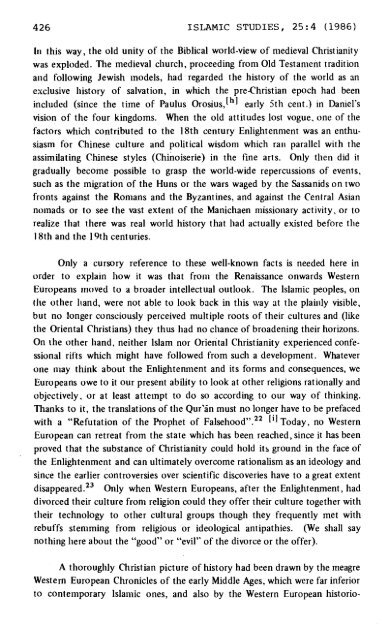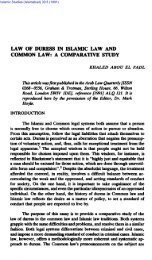ISLAMIC & WESTERN HISTORIOGRAPHY
ISLAMIC & WESTERN HISTORIOGRAPHY
ISLAMIC & WESTERN HISTORIOGRAPHY
Create successful ePaper yourself
Turn your PDF publications into a flip-book with our unique Google optimized e-Paper software.
426 <strong>ISLAMIC</strong> STUDIES, 25:4 (1986)<br />
In this way, the old unity of the Biblical world-view of medieval Christianity<br />
was exploded. The medieval church, proceeding from Old Testament tradition<br />
and following Jewish models, had regarded the history of the world as an<br />
e:tclusive history of salvation, in whch the prechristian epoch had been<br />
included (since the time of Paulus ~rosius,[~I early 5th cent.) in Daniel's<br />
vision of the four kingdoms. When the old attitudes lost vogue. one of the<br />
factors which contributed to the 18th century Enlightenment was an enthusiasm<br />
for Chinese culture and political wisdom which ran parallel with the<br />
assimilating Chinese styles (Chinoiserie) in the fine arts. Only thee did it<br />
gradually become possible to grasp the world-wide repercussions of events,<br />
such as the migration of the Huns or the wars waged by the Sassanids on two<br />
fronts against the Romans and the Byzantines, and against the Central Asian<br />
nomads or to see the vast extent of the Manichaen missionary activity, or to<br />
realize that there was real world history that had actually existed before the<br />
18th and the 19th centuries.<br />
Only a cursory reference to these well-known facts is needed here in<br />
order to explain how it was that from the Renaissance onwards Western<br />
Europeans moved to a broader intellectual outlook. The lslamic peoples, on<br />
the other hand, were not able to look back in this way at the plainly visible,<br />
but no longer consciously perceived multiple roots of their cultures and (like<br />
the Oriental Christians) they thus had no chance of broadening their horizons.<br />
On the other hand. neither lslam nor Oriental Christianity experienced confessionsl<br />
rifts which might have followed from such a development. Whatever<br />
one may think about the Enlightenment and its forliis and consequences, we<br />
Europeans owe to it our present ability to look at other religions rationally and<br />
objectively. or at least attempt to do so according to our way of thinking.<br />
Thanks to it, the translations of the Qur'in must no longer have to be prefaced<br />
with a "Refutation of the Prophet of ~alsehood".~~ lil Today. no Western<br />
European can retreat from the state which has been reached, since it has been<br />
proved that the substance of Christianity could hold its ground in the face of<br />
the Enlightenment and can ultimately overcome rationalism as an ideology and<br />
since the earlier controversies over scientific discoveries have to a great extent<br />
disappeared.23 Only when Western Europeans, after the Enlightenment, had<br />
divorced their culture from religion could they offer their culture together with<br />
their technology to other cultural groups though they frequently met with<br />
rebuffs stemming from religious or ideological antipathies. (We shall say<br />
nothing here about the "good" or "evil" of the divorce or the offer).<br />
A thoroughly Christian picture of history had been drawn by the meagre<br />
Western European Chronicles of the early Middle Ages, which were far inferior<br />
to conteiiiporary lslaiiiic ones, and also by the Western European historio-
















